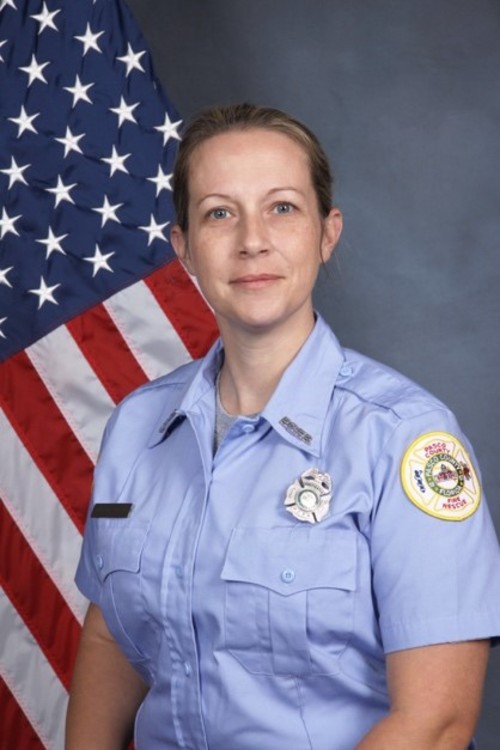Alumna Dr. Christine McGuire-Wolfe responds to hepatitis A at Pasco County Fire Rescue
May is Hepatitis Awareness Month
New cases of hepatitis A continue to rise across Tampa Bay, according to USF College of Public Health alumna Dr. Christine McGuire-Wolfe, with Pasco County ranking second in the state with overall number of cases.
She works on the frontline of infection control at the Pasco County Fire Rescue as an infection control officer where she puts her PhD in public health communicable diseases to practice.

In February, the department said they received notice from the Florida Department of Health that a firefighter was hospitalized due to complications from hepatitis A infection. It was determined that the ill firefighter has been infectious for a specific 14-day time-frame while reporting for duty and completing paramedic clinicals at three fire stations.
McGuire-Wolfe, who is also an assistant professor of infection control at the COPH, worked closely with the local health department to identify possible contacts and plan a response.
“Hepatitis A is spread through the fecal oral route,” she said. “It’s not large amount of fecal material, it’s microscopic amounts. So, it could be passed on if it’s on an inanimate object and someone passes it along and gets that on their hands somehow that gets into their mouth. The large outbreaks we hear about from the media usually involve an infected food service worker who contaminates food that is served to multiple people.”
Hepatitis A virus is a highly contagious liver infection causing symptoms such as nausea, vomiting, abdominal pain, fatigue, low appetite, fever, dark urine, jaundice, diarrhea, and joint pain.
For firefighters, McGuire-Wolfe says, risk of contracting hepatitis A from an infected co-worker is higher than typical work settings due to close living quarters.
“They work in a dormitory settings, they cook food together, it’s sort of like family communal living; they share bathrooms and clean the bathrooms that people use,” she said.

According to the Pasco County Fire Rescue Department, because the infected firefighter wore gloves during all patient contact, it was not felt that any patients were at risk of contracting hepatitis A.
“When we have an outbreak or potential outbreak that’s when all my background and knowledge from USF comes in to play in the real world, the things we talk about in textbook fashion play out in real life,” she said.
For the department, 101 potential employee exposures were identified, with 28 of those individuals already vaccinated against hepatitis A.
Pasco County Fire Rescue said that all of the remaining 73 exposures received post-exposure hepatitis A vaccination. Prior to this event, the department offered the hepatitis A vaccine to all field personnel as part of a voluntary infection control program.
The department also positioned disinfectant sprayers from the Clorox Corporation at all three affected stations so that crews could disinfect the station regularly. These efforts to contain the incident appear to have been successful, as no secondary cases were identified.
McGuire-Wolfe stressed that two ways to combat hepatitis A are through vaccination and proper handwashing.
“There is an effective two-dose vaccine,” she said. “Once people are vaccinated, they are protected from getting it. The second most important thing is handwashing. If I get hepatitis A it’s not necessarily because I didn’t wash my hands, it could be because someone preparing my food didn’t. Whether or not you’re practicing effective hand washing can actually impact the rest of the community around you.”
According to Pasco County Fire Rescue, a 100 percent vaccination coverage rate for exposed employees has been achieved and they are “confident that our response provided the best opportunity to confine the illness to the initial employee.”
McGuire-Wolfe earned her PhD in communicable diseases in 2012 and a graduate certificate in infection control in 2010. Prior to that, she earned her master’s degree in maternal and child health also from the COPH and bachelor’s degree in chemistry and psychology from Kalamazoo College in Michigan. She started volunteering with the Pasco County Fire Rescue Department before moving into a permanent position in 2003.
“My passion is finding that connection between emergency responders and issues related to infection control and public health overall,” McGuire-Wolfe said. “Creating that niche where we’re applying things we know in terms of public health and infection control to a setting where we don’t normally see it.”
She also teaches the cornerstone undergraduate course for the undergraduate minor in infection control at the COPH and saw a need for a more comprehensive but understandable textbook to share with her students. She’s taken her practical experience and knowledge of infection control and prevention and shared it in Foundations of Infection Control and Prevention, published by Jones and Bartlett Learning.
“I was looking at potential textbooks for the class and they were either too simplified or they were super expensive and too filled with jargon that undergrads not working in health care wouldn’t understand,” she said.
While she’s seen her fair share of occupational exposure cases, from bacterial meningitis to scabies, she said she’s already witnessing a culture of change toward infection control in her field.
“More and more in the fire service we’re trying to focus on the prevention,” McGuire-Wolfe said. “Historically, the fire service was sort of reactionary, we didn’t do vaccinations or screenings-things are starting to change toward a culture a safety where we’re trying to do things proactively and public health fits perfectly in those initiatives.”
***
COPH Alumni Fun Four:
What did you dream of becoming when you were young?
A teacher for the deaf.
Where would we find you on the weekend?
At the soccer field, both of my sons play competitive soccer and it’s started to consume our lives over the weekend!
What is the last book you read?
Special project papers from my students!
What superpower would you like to have?
Ability to teleport from one place to another.
Story by Anna Mayor, USF College of Public Health
